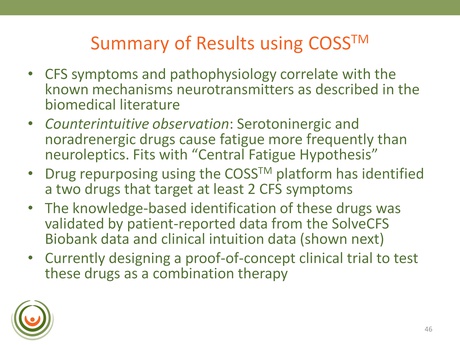Suzanne Vernon: I have a question for Bernard. I think that you alluded in your presentation to the fact that CFS appears to be on the right track as far as being able to be innovative and expedited in a disruptive way [*]. What kind of time frame would you put on us being a Chordoma or an MMRF or one of those organizations that clearly is innovative and doing good things?
Bernard Munos: I can give you a couple of rough sums [estimates?] there. If you go and try to develop a drug the traditional way, you are talking about a 10 to 15-year timeline, which is probably more than the patients in this room would like to see.
If you go the drug repurposing route the hope is there is that you can bring innovation to a patient within five years.
This can be speeded up if patients do join hands and collaborate and work together to help make it happen.
You've got physicians, scientists out there waiting to help literally; they just don't have the tools and they don’t have the data. I was thinking last night, that in any disease, natural studying involving a thousand patients would be a godsend, would be something that is hard to
fathom [imagine], but, needless to say enormously helpful to scientists.
The technology is available today and would probably allow thousands of CFS patients to enroll and collect the data within the next few months and make it available to the scientists. So I really think whatever timeline I can talk about, it's too long, but they can be shortened dramatically by getting serious about it and I know you're serious about it but I think you need to connect maybe better than you are right now.
Go to patients like me [and compare them to] those in the CFS community: there are hundreds of people like me and I think we have a million people with CFS in this country. There are many that could contribute but are not contributing for various reasons although, perhaps, simply because they are not aware of the possibilities. That's what we need to get better at. But I think if we do, we'll see those timelines shrink.
[Firestormm says: I didn't understand her use of 'disruptive' here. Any help would be appreciated. Thanks

]

